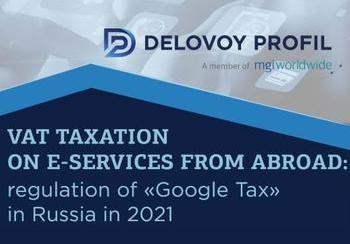VAT Taxation on E-Services from abroad: regulation of «Google Tax» in Russia in 2021

Since January 1, 2019, companies that provide electronic (online) services without a permanent establishment in Russia have faced «Google tax» - an informal name for value added tax (VAT). The tax has been applied to B2C services since 2017 but B2B sector fell under it only a few years ago. How does foreign business deal with this in Russia? This detailed review of «Google tax» is presented by Olga Yatsalo, leading international lawyer of Legal & Tax practice at MGI Worldwide's Moscow-based member firm DELOVOY PROFIL Consulting.
What is «Google tax»
«Google tax» is an informal name for the value added tax (VAT). Since January 01, 2017 the tax is laid on non-Russian companies providing electronic (online) services without a permanent establishment in Russia. The place of supply of electronic services shall be recognised as the territory of the Russian Federation.
At first, «Google tax» applied to B2C sector only, but since 2019 it has beed extended to include situations where the buyers are the Russian legal entities and individual entrepreneurs (B2B). Thus, now it is charged regardless of who the ultimate buyer is.
If a foreign provider performs e-services without the needed tax registration it will lead not only to a fine (10% of the income from the Save rendered services, with a minimum of RUB 40,000 according to Article 116 of the Tax Code), but also to negative consequences for the Russian buyers of such services, who will no longer be entitled to deduct VAT. As a result, those foreign providers may lose their Russian counterparts and damage their reputation in the Russian market.
What services are involved
- software and video games
- music, books, films
- advertisement and trade platforms
- search engines and social networks
- databases, hosting, websites
Tax rate
The tax base for «Google Tax» is defined as the cost of services taking into account the amount of VAT (tax gross-up), calculated based on the actual selling price.
For e-services to be rendered and paid from January 1 2019 the current estimated VAT rate of 16.67% shall be applied (Item 5 Article 174.2 of the Tax Code).
Who is on duty to pay
According to clarifications from the Russian tax authorities, payment of VAT may alternatively be made by the Russian businesses themselves rather than by the foreign providers. On April 24, 2019 the Federal Tax Service of Russia issued the ruling by which Russian purchasers of e-services have the right to calculate «Google tax» and transfer it to the budget by themselves, instead of the foreign provider, and later conduct a tax deduction.
But this neither disengages the foreign companies from an obligation to register as a VAT taxpayer, which is needed also for the Russian buyers to conduct a tax deduction, nor from submission of a VAT return with zero values.

About DELOVOY PROFIL Consulting
DELOVOY PROFIL Consulting is a team of professionals offering consulting services in various areas. The company has been a significant player in the Russian marketplace since 1995. According to rating agencies (RAEX, Pravo.ru, Kommersant), DELOVOY PROFIL Consulting ranks among the TOP consulting companies in Russia for the last few years.
Key competences of the firm include: tax and legal consulting, M&A services, management consulting and market researches, financial and investment consulting, consulting in accordance with Russian and international accounting standards (IFRS) and valuation services.
For more information contact Olga Yatsalo at [email protected] or visit the firm's profile page and website.
MGI Worldwide with CPAAI is a top 20 ranked global accounting network and association with almost 10,000 professionals, accountants and tax experts in some 460 locations in almost 100 countries around the world.
